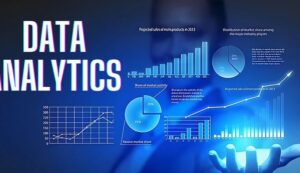The Role of AI in Data Analytics: Enhancing Decision-Making

In today’s era of abundant data, artificial intelligence (AI) has emerged as a transformative force in enhancing decision-making processes through advanced data analytics. This article explores how AI technologies revolutionize data analytics, enabling organizations to derive deeper insights, make more informed decisions, and gain competitive advantages across various industries.
Understanding AI in Data Analytics
Artificial intelligence encompasses a broad spectrum of technologies that enable machines to simulate human intelligence processes such as learning, reasoning, and problem-solving. When applied to data analytics, AI enhances systems’ capability to process vast amounts of data swiftly and accurately, uncover patterns, and generate actionable insights.
Key AI Techniques in Data Analytics
- Machine Learning: Machine learning stands as a foundational pillar of AI in data analytics. It allows systems to learn from data, identify patterns, and make predictions or decisions with minimal human intervention. This capability is crucial for tasks such as predictive analytics and anomaly detection.
- Natural Language Processing (NLP): NLP focuses on enabling machines to understand, interpret, and generate human language. In data analytics, NLP plays a pivotal role in analyzing unstructured data sources such as text documents, social media content, and customer reviews to extract meaningful insights and sentiments.
- Computer Vision: Computer vision empowers machines to interpret and understand visual information from the world. In data analytics, this technology is utilized to analyze and derive insights from images, videos, and other visual data sources. Applications range from medical imaging diagnostics to quality control in manufacturing.
Enhancing Decision-Making with AI in Data Analytics
Integrating AI into data analytics provides several significant benefits that enhance decision-making processes across industries:
1. Improved Accuracy and Speed
AI algorithms process and analyze massive datasets at speeds far exceeding human capabilities. This capability not only enhances the accuracy of insights derived but also accelerates the decision-making cycle. For instance, in financial markets, AI-powered algorithms analyze market trends in real-time, enabling traders to make timely and informed investment decisions.
2. Predictive Analytics
Predictive analytics leverages AI to forecast future trends and behaviors based on historical data patterns. Organizations can utilize predictive models to anticipate customer preferences, demand fluctuations, equipment failures, and more. This foresight enables proactive decision-making and strategic planning to mitigate risks and capitalize on opportunities.
3. Personalized Recommendations
AI-driven recommendation systems analyze user behavior and preferences to deliver personalized experiences. For example, in e-commerce platforms, these systems suggest products based on past purchases or browsing history, thereby enhancing customer satisfaction and increasing sales conversion rates. Similarly, content streaming services use AI to recommend movies and shows tailored to individual viewer preferences.
4. Risk Management
In industries such as insurance and healthcare, AI-powered analytics play a crucial role in risk assessment and management. By analyzing historical data and identifying risk factors, AI algorithms can assess insurance claims or predict potential health issues. This capability helps organizations mitigate risks effectively and make informed decisions to protect assets and ensure customer safety.
5. Operational Efficiency
AI optimizes operational processes by automating routine tasks and optimizing resource allocation. In manufacturing, AI-powered systems monitor production lines in real-time, predict equipment maintenance needs, and adjust workflows to maximize efficiency and minimize downtime. Similarly, in supply chain management, AI enhances inventory forecasting accuracy and logistics optimization, thereby reducing costs and improving delivery reliability.
6. Real-time Insights
AI’s ability to perform real-time data analysis enables organizations to respond promptly to changing market conditions and emerging trends. Retailers can adjust pricing strategies based on competitor pricing and customer demand fluctuations. Healthcare providers can detect outbreaks or unusual health patterns early, facilitating timely interventions and improving patient outcomes.
Challenges and Considerations
While AI offers substantial benefits to data analytics and decision-making, several challenges and considerations must be addressed:
- Data Privacy and Security: AI algorithms heavily rely on vast amounts of data, raising concerns about privacy breaches and data security.
- Bias and Fairness: AI models can inherit biases from training data, leading to biased decisions or outcomes that impact fairness, especially in sensitive domains like recruitment or lending.
- Skill Requirements: Implementing AI-powered analytics requires specialized skills in data science, machine learning, and AI. Organizations must invest in training or hiring professionals with the expertise to develop and deploy AI solutions effectively.
The Future Outlook
Looking ahead, AI’s role in data analytics is poised for continued evolution and innovation. Emerging AI technologies such as reinforcement learning, federated learning, and automated machine learning (AutoML) promise to further enhance data analytics systems’ capabilities. Moreover, AI-driven advancements in autonomous decision-making and natural language understanding will redefine how businesses operate and interact with data.
In conclusion, AI has emerged as a cornerstone in modern data analytics, revolutionizing decision-making processes across diverse industries. By harnessing the power of AI-powered analytics, organizations can unlock valuable insights, optimize operations, mitigate risks, and ultimately gain a competitive edge in today’s dynamic business landscape.
Professionals looking to capitalize on these transformative technologies can benefit immensely from pursuing a Data Analytics Certification Course in Bhopal and cities in India. Such courses provide comprehensive training in AI-driven data analytics, equipping individuals with the skills and knowledge needed to harness AI effectively and drive innovation in their respective fields.








